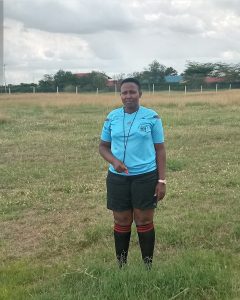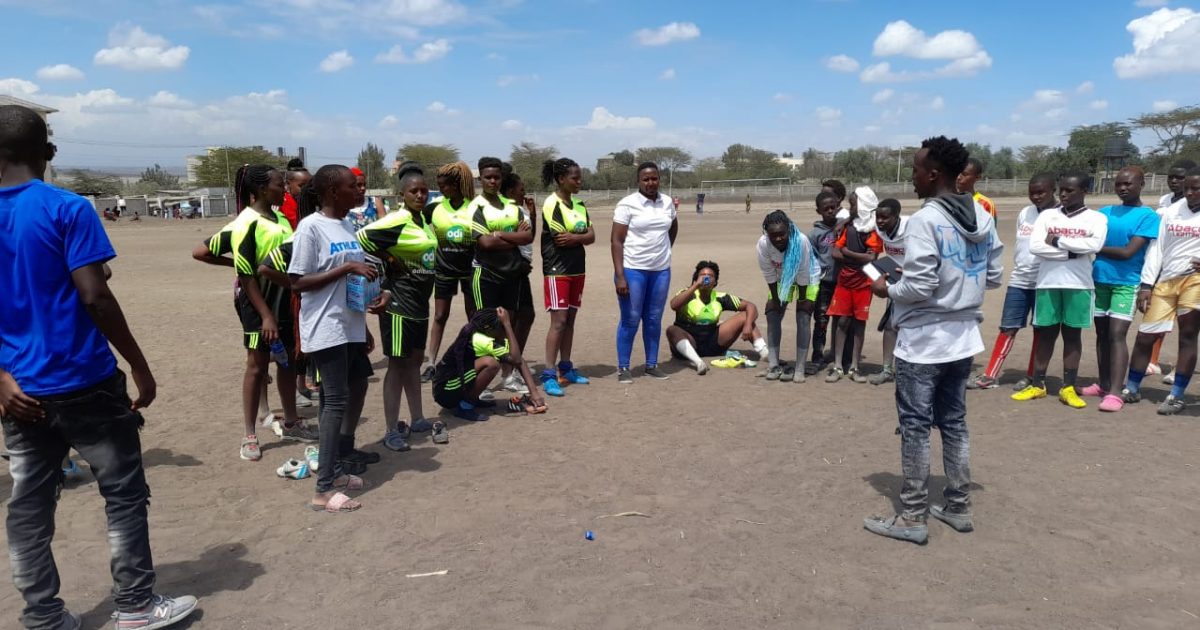For many years, Maasai women were confined to the homestead to look after children, livestock, collect firewood and fetch water among other household chores.
However, this narrative is gradually changing with time as more women from the community continue to access modern education that has in effect defined new roles for them, away from the previous cultural norms.
The story of 41-year-old Tracey Matayian’s is one of inspirational, brevity, liberal and defying all the odds to become the first ever Maasai female referee.
In an interview with KNA, Monday, Matayian said during her formative days, she couldn’t hide her passion for the game and would join local boys, every time she saw them play, which made her to be branded several names by the other girls and occasionally getting reprimanded by her parents for always keeping male company.
“I was very passionate about football from the time I was young and would join the boys in high school as they played, while other girls who sat at the field mocked that I was becoming a tomboy,” she narrates.

Matayian said her parents would then warn her to shun the company of boys and stick with her gender mates, but she would always assure them that she was out to only play football and nothing more.
“Little did they know that this was actually making me gain confidence and courage in turning off boys and resisting their advances,” she added.
Matayian later joined a teachers’ training college where she now got an ample chance to play freely, unlike some of her school mates in high school who later dropped out due to teenage pregnancies and went ahead to be married at their tender age.
After clearing college, she worked with Compassion International and would often encourage children of both gender to play football and also train them on how to play the game.
“It was then that I got an opportunity to referee a game between Rongai Football Club and Compassion International. There was no other referee at the time and since I was readily available, I went ahead to officiate the match,’’ she recalled.
Matayian revealed that after the game, she was motivated to do more than just play and train the young children as she also developed deep interest in refereeing.
She would later help form football teams for both boys and girls from the locality namely Olturoto Sharks and Talanta Football clubs respectively.
“The game keeps them busy as they get to spend time in the field, especially during the period they were home due to the pandemic. Football is a game of rules, thus it ends up instilling discipline and character to the young boys and girls,” said Matayian.
She revealed that many of the youth were previously loitering and engaging in alcohol and drug abuse due to idleness, but through this football engagement she has managed to keep them busy.
“Many of them were only roving around towns, taking drugs and this compelled me to find a way to keep them busy through sports. I am elated that since we started training, most of them have since reformed and are now even performing better in class,” she said.
Apart from football, Matayian also involves the youth in youth empowerment programs and even mentors them on life issues.
Subsequently, three of the girls she trains have already managed to get bursaries through her efforts, thus enabling to continue with their education without undue interruptions.
“I get an opportunity to interact with politicians when they attend the tournaments and I am able to request for bursaries for the players, since some of them are orphans, while others come from needy families,” added Matayian.
However, her efforts to fulfil her passion have not gone without challenges, citing that men in the community are yet to fully embrace women who get actively involved in sporting activities.
“The first ever big game I umpired in Maasai land was between the Nados and Olturoto Sharks. The moment some uncouth men saw that I was the one refereeing, they started hurling insults but I continued without fear. They tried to start a commotion with a view to influencing my decision on the pitch but I stood firm, thanks to my training in coaching,” she said.
Another challenge she also encounters is criticism on her dress code. “This becomes a big issue to some people. They always complain that I have disregarded our culture by wearing shorts, thus a show of immorality in their own perspective. But I have no option, since that’s the official dress code for the game and I always explain the same that to my beloved people, though it took long for me to be accepted by my community,” notes Matayian with satisfaction.
The referee, a mother of three, also says that her husband was not supportive of her passion at the initial stages. He always complained that I was mostly in the company of men and that did not go well with him.
However, he later on changed his perspective after Matayian bought four doper sheep and brought them home after being paid after refereeing a game. She then built a house at their matrimonial home which further elated the husband.
At the same time, balancing career, family and football has proven to be an uphill task for Matayian. “I usually meet the girls and boys over the weekends during school term, but once schools close, we met on Monday, Wednesday and Friday afternoons so as to keep them busy and this often clashes with my work programme so I have to really squeeze my time,’’ she added.
Funding for the two football teams is equally a big challenge. She depends on the salary she earns from being an Early Childhood Director at the Kitengela Ward and the prizes they get from winning the tournaments they play.
Meanwhile, Matayian looks up to renowned female French football referee, Stephany Frappart and our own Charles Lemein, as her role models, even as she longs for that day when Kenyans perspective on matters women football and sports will change for the better.
By Diana Meneto





